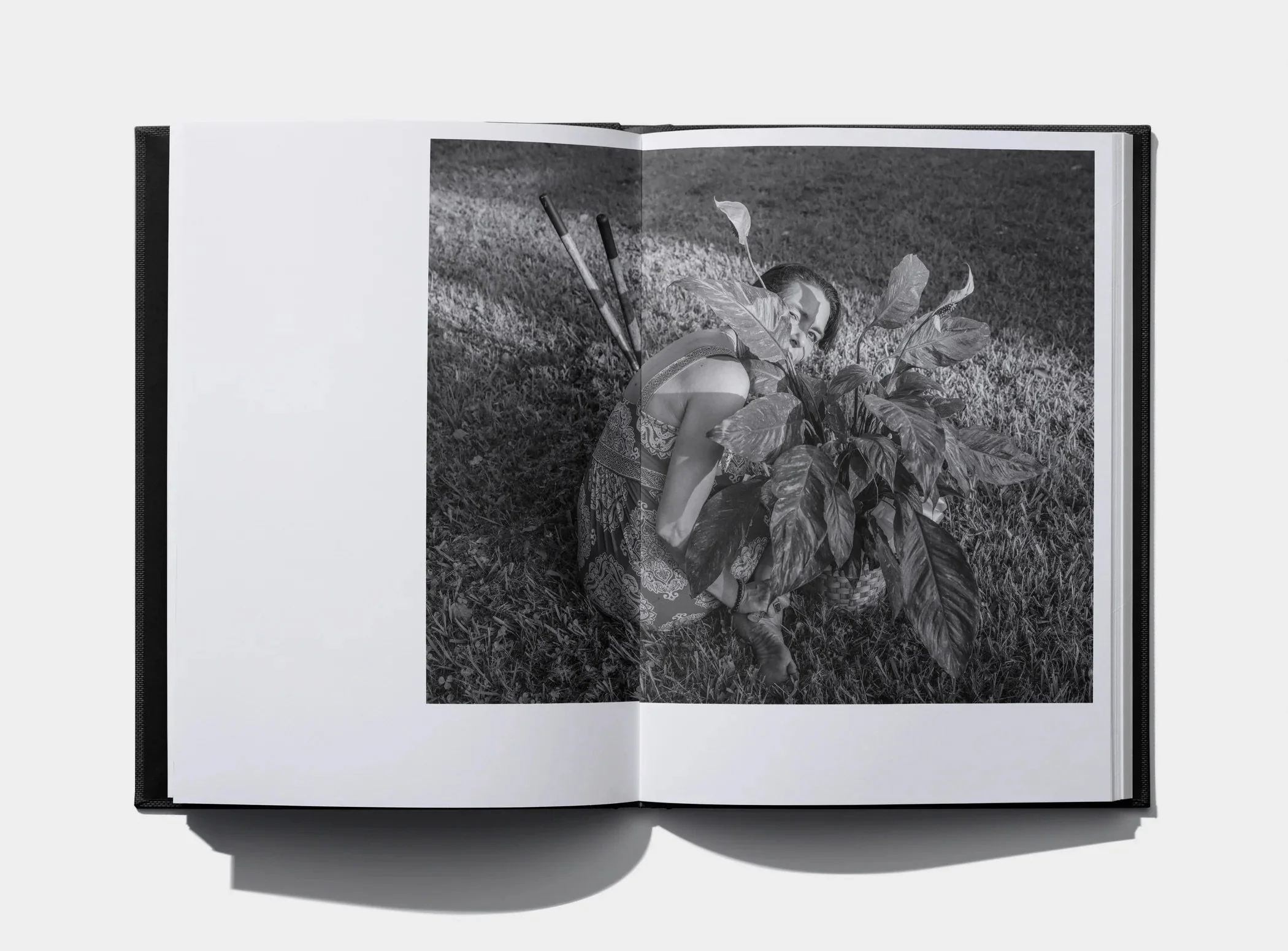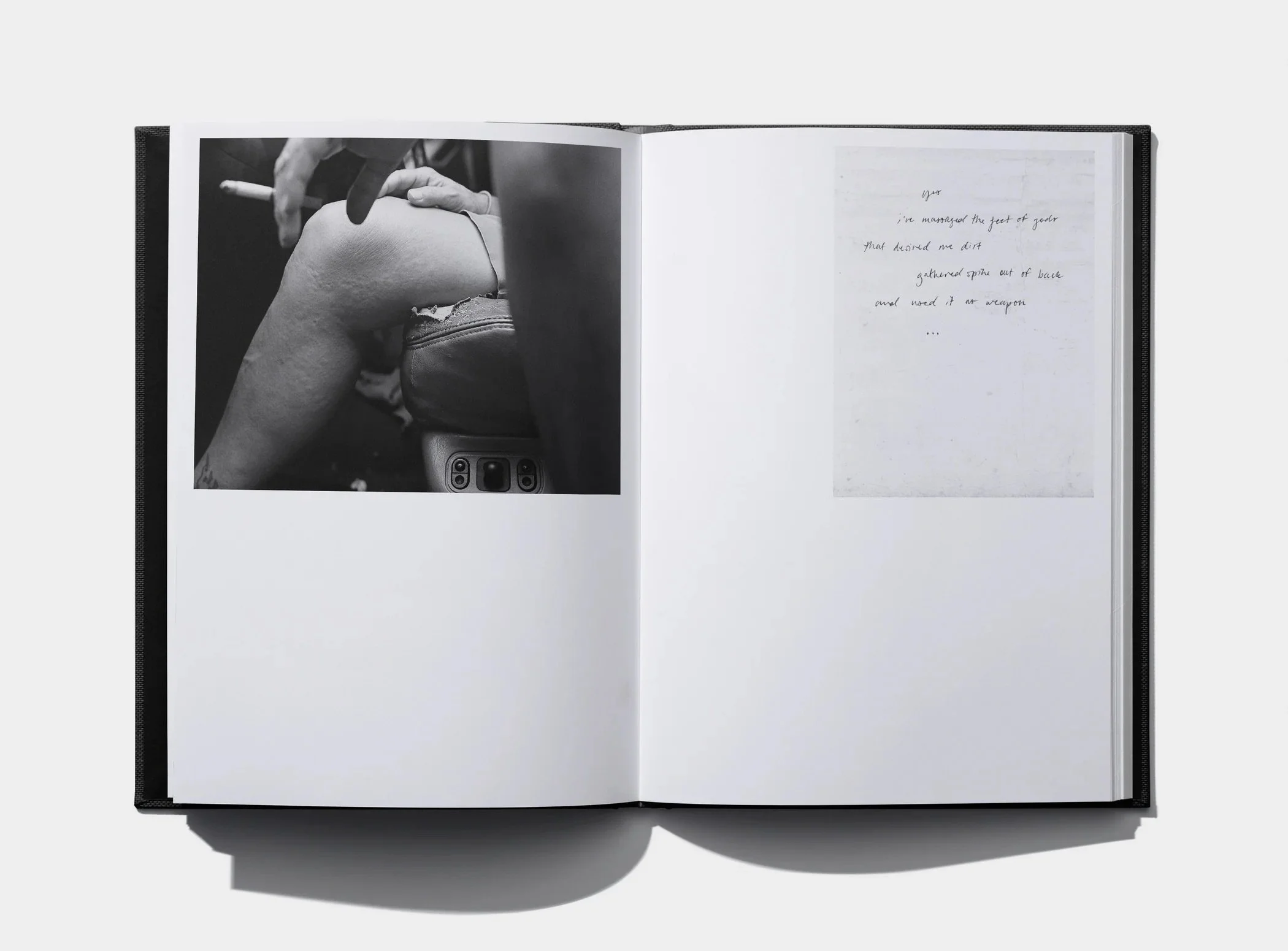Chance DeVille
Chance DeVille
Growing Tired of Calloused Knees
92 pages
250x180x15mm
First edition
Gnomic Book
2025
About the Book:
Growing Tired of Calloused Knees is a book that attempts to carry the multitude of issues that stem from domestic abuse as the catalyst for the persistent cycle of mental illness, poverty, and substance abuse.
Chance DeVille's mother was physically and mentally abused by his former stepfather. As a result, she was diagnosed with paranoid schizophrenia and severe post-traumatic stress disorder. Absent psychiatric help, she turned to drugs and alcohol to suppress the disease. For a decade, DeVille photographed her at their home in Louisiana as an attempt to understand this abuse on an intimate level.
The photographs and related material within attempt to hold empathy, understanding, and care while showcasing the visual representations of these difficult topics to understand the overbearing weight of exhaustive circumstances, a space that holds grief and hope for both the living, dead, and worlds imagined.
This project is not only a photographic investigation of DeVille's mother, but a way to build a new relationship through collaboration and documentation, showing the sum of the permanent effects of abuse: poverty, disordered living, relationships left to be rendered, letting the viewer in on the irreversible effects of schizophrenia and addiction. The book is their reclamation — or perhaps, more bluntly, DeVille's attempt to resolve his endless grieving of his living mother.
Images courtesy of the artist and Gnomic Books
Book review by Jeff Smudde |
In Chance DeVille’s first book, Growing Tired of Calloused Knees, the tone is set by initial writings by professor Odette England, “Out of hues and cries.” The writing, in England’s signature poetic wordplay, generates a kind of unease, yet develops a yearn for care. This emotion is felt throughout the book of DeVille’s work made of and about his mother in Louisiana. The book is quiet throughout the entire sequence. With a stature of a large journal (even an elastic band to hold it closed), the book becomes a meditation and public-personal depiction of this relationship between DeVille and their mother.
The first photographs set the scene – A house, a painting, an overgrown fence. DeVille puts the viewer into a domestic setting right in the front of the book, and never leaves. As they put it in their writing at the end of the book, the book is “a love letter.”
Images courtesy of the artist and Gnomic Books
Images courtesy of the artist and Gnomic Books
Each image through the book is a reminder and a meditation of the importance of care, connection and understanding. Whether a silhouetted figure of Tammy, or a hand pressed on a broken car windscreen, each image keeps you. Often supplemented by hand-written notes, we see into this relationship DeVille has invited us to see and latently work to understand. There is an internal struggle noted in one of these – “maybe I have tried to intellectualize our suffering into silver.”
When photographing loved ones, especially those who have gone through such pain, care and empathy are integral. Through the book, DeVille’s pacing of the images begins to create a feeling of pacing the room. “I place you neatly in a negative, expose you twice, fold it carefully, and pray to god for your survival,” one of DeVille’s intermittent notes reads, a furtherment of the internal need to care for their mother. The camera has become a tool of caregiving for them, a way to work out the cognitive and situational barriers that lay in such a precarious space.
Images courtesy of the artist and Gnomic Books
Images courtesy of the artist and Gnomic Books
From a formal standpoint, DeVille’s photographs are far from glamourized. The images are raw in their quietness, the photographs guide us through the time spent with Tammy without creating a sensationalized narrative. They are personal and imperfect while they lead us through the sequence. A photo of her looking upward, her face baked by the sun, is also the photograph on the back of the book. Following is an image of dense clouds, the live-giving star illuminating the contours of the sky.
“I keep pressing my eyes until I can no longer see, break down and make the camera and the sun to all of the work for me”
Collaboration with loved ones is no small feat, yet still a common method of working in photography. However, DeVille’s work lives in a different realm of photographs of family. The collaboration between them and their mother, Tammy, was not just a means to make images, but far more than that. There is a deep love and care for the relationship that DeVille has worked toward with Tammy, and the work shows this as potent as it can get.
This book lives as a document of DeVille’s unwavering care and love for their mother, for the cause of support and dedication to survivors of abuse and trauma. Growing Tired of Calloused Knees is more than a photo book, more than a visual journal of these visits, but a championing of matriarchal relationships through untangling the realities that have been lived, and making art to connect with those who feel a need to care for others who have also endured darkness.
Images courtesy of the artist and Gnomic Books










